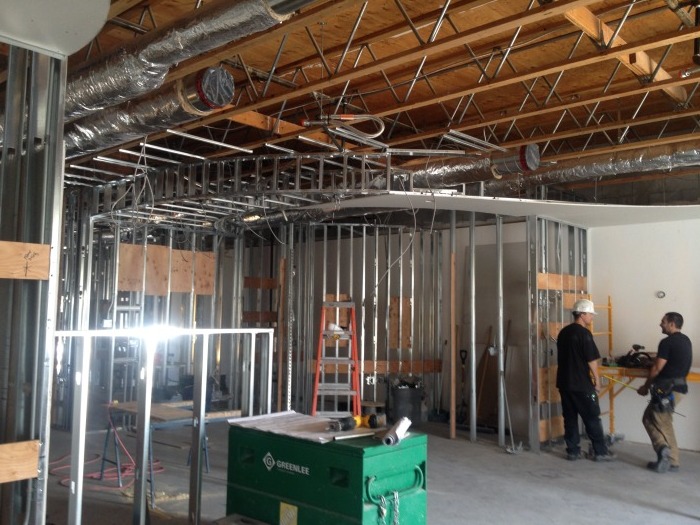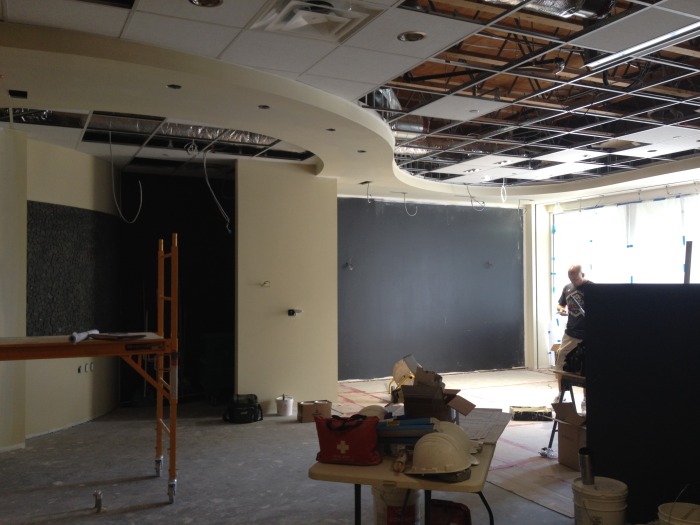There are a number of General Contractors out there, but they are not all equal by comparison. Hiring the right contractor takes some careful research and due diligence. If you have hired an Interior Designer or Architect, part of their scope of work should be to aid you in the quest to find the right General Contractor for your project.
Both Architects and Interior Designers have established relationships with a variety of Contractors who can participate in the project tender. Additionally they are able to recognize contractors who will best fit your project goals allowing you to obtain the best combination of pricing, quality, and scheduling.
 |
That being said, whether you are working with a design consultant or not, you (the Client and Owner), will be the one hiring the General Contractor, so it is extremely important to make sure you do your homework. Read on for a few tips to make the process of hiring a General Contractor a little less daunting. We will touch on:
- Licenses and Permits
- Insurance
- References
- Contract Terms
- and More.
Licenses and Permits
Like any business, General Contractors are required by law to have a current business license through the municipal Government. These licenses expire yearly, so when you ask to see it, inspect it closely to ensure it is current. Municipal Governments also provide permits for various trades: mechanical (heating, cooling, plumbing), electrical, and renovation. Although these permits and licenses do not ensure a quality tradesperson, they are important to have.
 |
Insurance
Make sure your General Contractor carries the proper insurance to cover any accidents that could occur on the job site. There are a variety of insurance types, your Contractor should have all of them. These include insurance against damage to the existing condition of the job site, injury of any workers, and replacement of any on site equipment or materials. If the Contractor does not have insurance, demand that they obtain some â temporary coverage is available.
 |
References
If the Contractor is experienced and able to perform quality work, they will be able to provide solid references from other trades and previous clients. It seems like a lot to ask, but they should be able to easily supply at least 20 current people and/or businesses for you to interview. You donât have to call every reference or interview them in great detail, but randomly selecting at least 5 from the list should provide the information you need. What sorts of questions should you ask?
- Did the Contractor complete the project on time? If not, were they able to work with the Client to satisfy and complete the project within a satisfactory timeline?
- Was the project completed on budget? If not, were they able to work with the Client to satisfy and complete the project within a satisfactory budget?
- Were there any problems on the job? If so, how were they handled?
- Was the Contractor respectful and easy to work with?
- Were there any unexpected or disputed charges? If so, were they addressed in a satisfactory manner?
- Were they happy with the end result? Have there been any deficiencies after project completion, and if so, how were they handled?
After your interviews, go to past projects in order to view some of the Contractor’s finished work.
 |
Terms
Always put the terms of your verbal agreements into a written format. Your Interior Designer or Architect should be able to provide you with a contract for your use. The contract should include:
- Date,
- Identification of the Owner and Contractor,
- Project Specifications, or a reference to a drawing set,
- The scope of work, the expectations of the Owner and the Contractor,
- The proposed start and completion date,
- Times/days the Contractor is provided access to the job site,
- Outline of compensation and payment (refer to note below),
- Address a warranty period,
- Outline requirements for permits, licenses and insurance,
- Identify the required level of expertise of any Personnel working on the project, and
- Names and Signatures of the Owner, Contractor, and Witnesses.
Note, we always recommend holdbacks. The Contractor will invoice the Owner, the owner submit payment based on work completed minus a 10-15% holdback amount. At successful completion of the work, the Owner then releases any holdback amounts to the Contractor.
 |
Miscellaneous:
Here are a few additional tips to help you avoid selecting the wrong Contractor:
- Do your research and narrow your bidders list to 3 Contractors. Ask each Contractor to provide a quote to ensure you are getting a fair price. When doing this make sure each Contractor has been given the same information to quote on, so you can make an equal comparison. All submitted quotes should include a description of the scope of work.
- Check the Better Business Bureau to make sure there are no negative claims against the Contractor.
- Deposits or retainers for a Contractor should never be more than 15% up front. Sometimes a Contractor will need a small deposit (i.e. $2500) to secure his time. Then once he arrives with his tools on site, the remainder of the deposit is required.
- Only agree to payment schedules based on completion of work - not based on time.
- Ensure you Contractor has obtained the necessary permits. If you aren’t sure which permits are required, contact your Municipal Government.
- Do not pay your Contractor in cash; always use a cheque or certified cheque. Also ask for a receipt for any payments you have made. This way you can keep track of any money paid in case the project does go off-course.
- Last but not least, if something doesn’t feel quite right, it probably isn’t. Listen to your instincts â- they are often right.
Now go get yourself a Contractor! Good Luck!